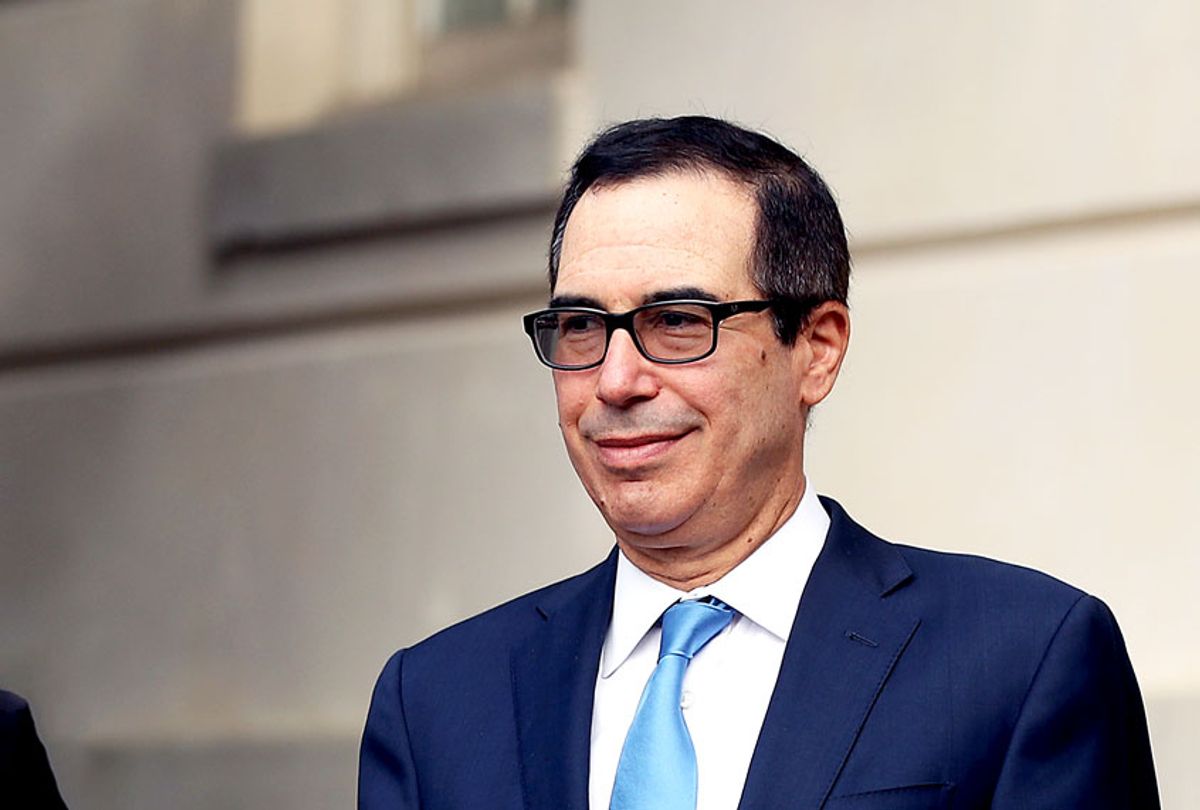The Trump administration quietly used loopholes built into the 2017 tax cuts to give big corporations an even bigger tax savings.
The tax cut bill passed by Republicans in 2017 overwhelmingly benefited the wealthy and big corporations, according to a House Budget Committee report issued earlier this year. The law gave individuals a modest short-term tax cut while permanently slashing corporate taxes from 35 percent to 21 percent. The new law has greatly contributed to the 50 percent growth in the budget deficit since President Trump took office.
But that was not enough for big corporations, which launched intense lobbying efforts to carve out even bigger breaks in the bill’s loopholes. The effort led the Treasury Department to quietly change rules to hand big companies an even bigger tax break, according to The New York Times, costing taxpayers billions in lost revenue.
“Treasury is gutting the new law,” University of Houston tax law professor Bret Wells told the Times. “It is largely the top 1 percent that will disproportionately benefit — the wealthiest people in the world.”
Republicans used budget reconciliation, a congressional process that allowed the Senate to pass the tax cuts with 51 votes instead of 60. But that process requires a bill that will contribute less than $1.5 trillion to the deficit over 10 years, so Republicans decided to offset the cost of the corporate tax cut by eliminating a wide range of corporate deductions and introducing new taxes.
One of the biggest new taxes was the "base erosion and anti-abuse tax," or BEAT, which aimed to cut down on foreign companies with large American operations avoiding US taxes by sending their profits to countries with lower tax rates. The other was a provision on "global intangible low-taxed income," or GILTI, which imposed a tax up to 10.5 percent on some offshore income.
The Joint Committee on Taxation estimated that these two new taxes would add $262 billion in revenue over the next decade, which the Times noted would be enough to fund the entire Treasury Department, the Environmental Protection Agency and the National Cancer Institute for 10 years.
But the new taxes also featured many loopholes, and “almost immediately” after Trump signed the tax bill, companies launched an aggressive lobbying effort to carve out breaks for themselves in the law, the Times reported.
Chip Harter, a longtime tax attorney who advised companies on how to avoid taxes — before being appointed as the Treasury official in charge of writing rules regarding the new taxes — and his team “found themselves in nonstop meetings — roughly 10 a week at time — with lobbyists” from those companies, according to the Times report. Many of the lobbyists were from the same firms that Harter had previously worked for.
Earlier this month, the department released the final version of some of the BEAT rules that allowed companies to use a “complex currency-accounting maneuver” to avoid paying the tax, according to the Times, giving the lobbyists what they had pushed for.
Foreign banks like Barclays and Credit Suisse also staged an aggressive lobbying effort to carve out an exemption in the BEAT law. The lobbyists included Erika Nijenhuis, who represented the Institute of International Bankers. Harter got Treasury Secretary Steven Mnuchin to approve new exemptions for the banks earlier this year, before the tax office announced even more exemptions. In September, Nijenhuis was appointed to a job at Treasury's Office of Tax Policy.
Officials at the Joint Committee on Taxation projected that the exemptions for international banks alone would cut revenue by up to $50 billion.
All told, BEAT is only likely to collect “a small fraction” of the $150 billion projection, tax adviser Thomas Horst told the Times.
The department made the moves even as Treasury officials warned Harter that it may lack legal authority to exempt bank payments from the law. Harter dismissed the objections, according to the Times.
“We thoroughly reviewed these issues internally and are fully comfortable that we have the legal authority for the conclusions reached in these regulations,” a Treasury Department spokesperson told the Times.
Companies like Procter & Gamble, News Corp., Comcast, Liberty Mutual and Anheuser-Busch also launched an intense lobbying effort to exempt themselves from GILTI. After months of meetings with lobbyists, the department announced the rules that the companies had pushed for in June.
As a result, companies “continue to shift hundreds of billions of dollars to overseas tax havens” and the IRS is collecting tens of billions less in revenue than Congress projected, the Times reported. In 2018, the United States lost more tax revenue than any other developed nation, according to the Organization for Economic Cooperation and Development.
But big companies may have even more tax breaks coming.
“In the coming days, the Treasury is likely to complete its last round of rules carrying out the tax cuts," the Times reported. “Big companies have spent this fall trying to win more.”

Shares